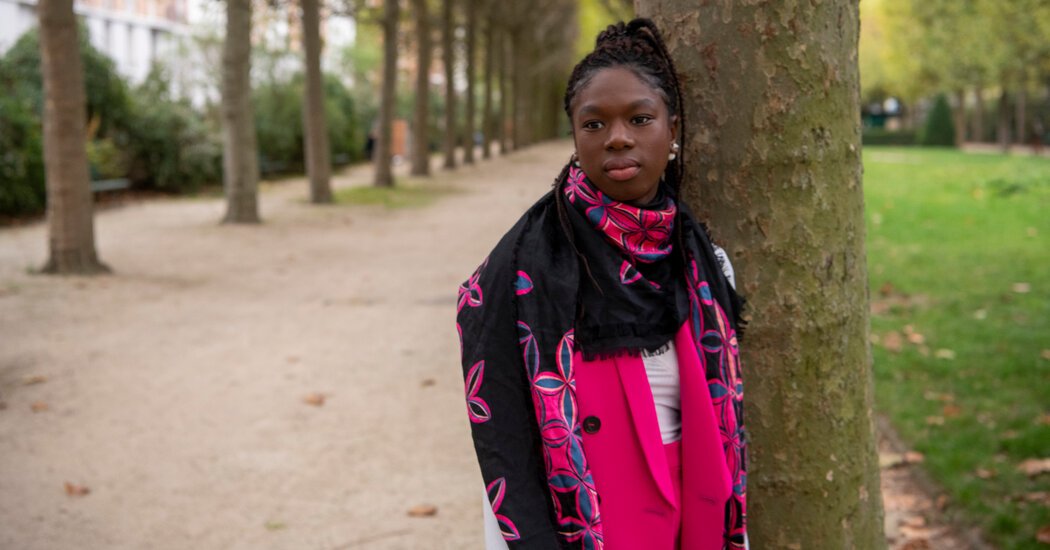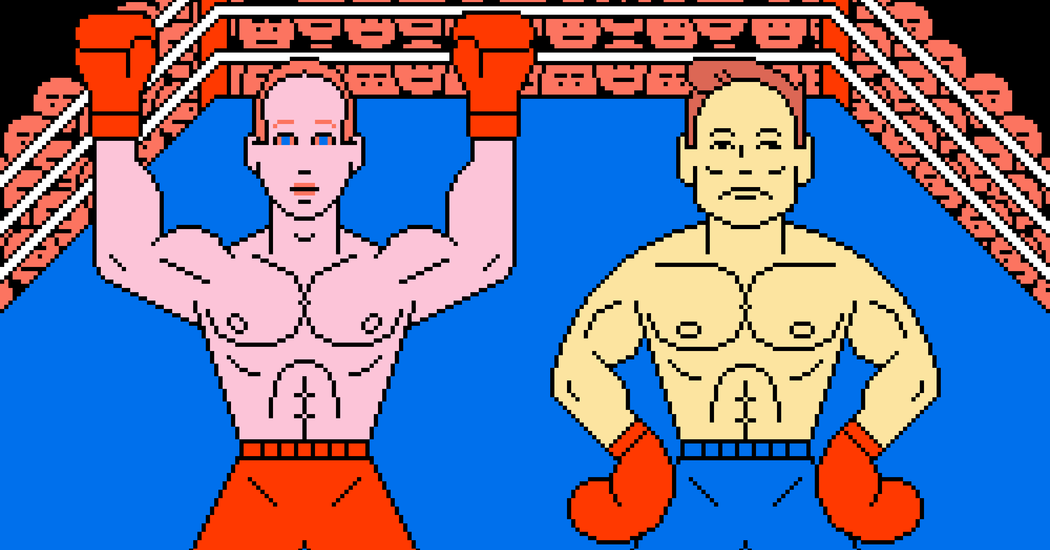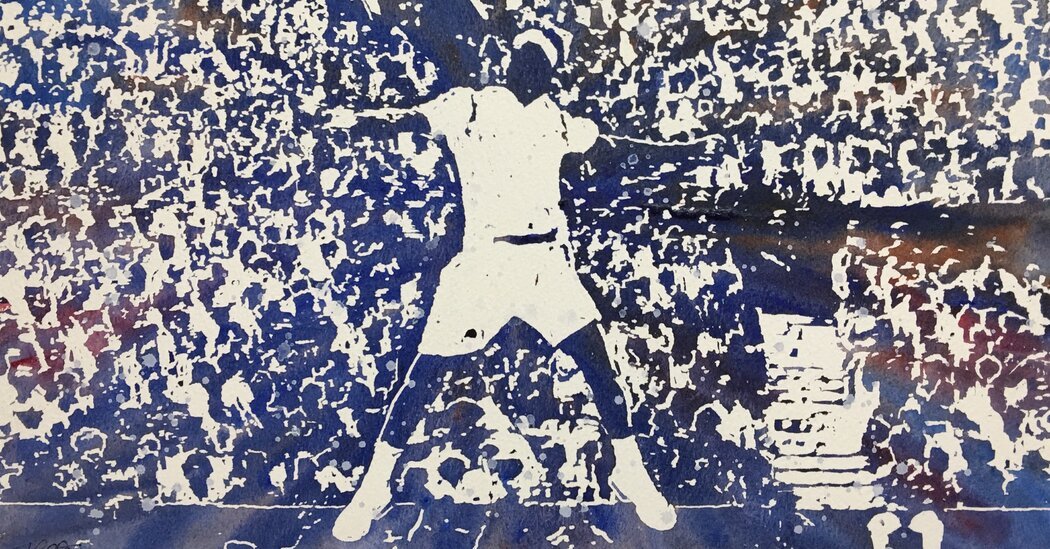
The Mystery That Ended Two Women’s World Cup Dreams
[ad_1]
Aminata Diallo was being escorted from her foul-smelling holding cell to an interview room inside the Hôtel de Police in Versailles the first time she heard the name Tonya Harding.
Harding’s name is infamous in sports, of course. A decorated American figure skater, she was a central figure in the notorious case involving the assault of her biggest rival only weeks before the 1994 Winter Olympics. The scandal — a sudden and violent attack by a mystery man; accusations and denials; tabloid headlines — led to worldwide attention and, years later, a feature-length movie about Harding. But to Diallo, a 28-year-old French soccer player being led up a police station stairwell, the mention of her name — “Have you heard of Tonya Harding?” — produced only a blank stare.
Diallo would quickly learn, however, that the police had reason to ask.
Harding’s rival, Nancy Kerrigan, had been attacked by a man who beat her on the legs in an attempt to keep her from competing. Now, in France, a generation later, the police suspected a similar motive in an attack on Kheira Hamraoui, Diallo’s teammate at the French club Paris St.-Germain. Hamraoui had been dragged out of Diallo’s car on a cold November night in 2021 and, like Kerrigan, beaten on her legs in a clear attempt to injure her.
It would take almost a year, and another spell in detention for Diallo, before the police officer’s offhand question became a formal accusation. Prosecutors last September charged Diallo with aggravated assault in the attack on Hamraoui. Documents in the case and leaks to the French news media have accused Diallo of masterminding a premeditated attack. The goal, that theory goes, was to eliminate a rival of Diallo’s for a spot in the lineup at P.S.G., one of the best teams in women’s soccer, and on the roster of the French national team, which will be among the favorites at the Women’s World Cup, which begins July 20.
“Lots of people would like it to be me, but that’s not the reality,” Diallo said in an interview in Spain, where she had been trying to resurrect her career. “Tonya Harding, she did it. I didn’t.”
Doubts, and Questions
With its parallels to a decades-old scandal; its themes of race and professional rivalry; and its unlikely cast of elite women’s athletes and shadowy characters, it is no surprise that the case continues to draw interest, or that it has spawned competing documentary projects.
Diallo’s guilt or innocence is no clearer today than it was that morning in the police station in Versailles. A trial date is yet to be announced. But the consequences continue to ripple outward.
Friendships have ended, as has at least one marriage. Two locker rooms were divided. Diallo was exiled from Paris. Hamraoui, too, became an exile in her own way, ostracized by some of her teammates and eventually forced out of her club.
The police’s case apparently rests on text messages sent by Diallo, some suspicious web searches and a claim by at least one of the men charged in the assault that he had been acting on behalf of Diallo, even though he admitted the order had not come directly from her.
Diallo and her legal team insist the charges are the actions of a desperate police force looking to secure convictions in a high-profile case, of a case built on flimsy connections and untrustworthy sources.
Diallo said she views the documentary offers as a sort of compensation for everything that she has lost, like the privacy and anonymity she once enjoyed as a stalwart, if unspectacular, soccer professional, but, more materially, for the new contract with P.S.G. that she insists was all but certain before the attack changed the direction of her career and life.
“I think for them it’s interesting whether I am guilty or not,” Diallo said of the filmmakers who have approached her.
The charges she faces — three counts of aggravated assault and criminal assault — came after her second stay in custody and were accompanied by an order not to enter Paris or engage with her former teammates on P.S.G. That was how she found herself in Spain this spring, nibbling patatas bravas and garlic shrimp at a beachside restaurant in Valencia, her career saved only by a short-term deal to play for Levante, which has now ended.
Hamraoui has left P.S.G., too; she was released at the end of the season after not being offered a new deal. Her departure was not a quiet one: On her way out, she accused the club of ostracizing her by treating her differently from her teammates, of victimizing her again.
“In addition to the trauma I suffered that night, I would face this indifference, this cruelty, not to say a form of abuse toward me,” Hamraoui wrote in a book published recently that has been serialized in the French sports newspaper L’Equipe.
“The squad no longer speaks to me, and P.S.G. has only one objective: that I leave as quickly as possible,” Hamraoui said. “They treat me like a plague victim.”
In Spain, Diallo’s life became a stripped-down version of what went before. Apart from training sessions, she spent most of her time alone at a rented apartment. (Qatar-owned P.S.G. had provided a home and a car, the one involved in the attack.) She was not a standout for her new team, and was often deployed as a substitute, a role she was grateful for, and accepted.
“I’ve found it difficult to find the top, top level,” she said as the now finished season meandered toward its conclusion. “I’ve lost the pleasure to play. I’m playing with injustice.”
Diallo contends that she has been wronged, that she is also a victim in the Hamraoui affair. Investigators in France contend she is at the heart of the conspiracy.
Details of their case, leaked to the French news media, paint Diallo as the driving force of the attack on Hamraoui. The men who have been charged with the assault itself are said to have told the police that they believed they were acting on behalf of Diallo, who was driving the car when it was stopped and when Hamraoui was yanked out and beaten on her legs with an iron bar. Text messages from Diallo disparaging Hamraoui were discovered after the police seized her cellphone and computer, as were online searches for phrases like “breaking a kneecap” and “deadly cocktail of drugs.”
In an interview last November at the offices of her lawyers in Paris, shortly after she was formally charged, Diallo offered explanations. The police had ignored all the positive comments about Hamraoui she had made to friends and associates, she said. The online searches were not unusual, she contended, for an athlete concerned with injuries and health.
But she also contends that her race and background — she is a Black woman from a working-class neighborhood in Grenoble — had not only led the police to jump to conclusions about her, but others as well.
“In France, when there’s a case like that, the media are quick to assume that you’re guilty,” she said. “They are going to bring up where you’re from right away, which is an argument to show that you are capable of doing that.”
Now, in Valencia, Diallo produced her phone and brandished a screenshot of a diagram published by the French daily Le Parisien that used arrows and boxes to purportedly show links between the men involved in the attack, Diallo and unknown intermediaries. The fact that after all the investigations, the phone taps and the listening devices placed in Diallo’s home, the police still had not found any direct link between her and the arrested men highlighted the weakness of the case against her, Diallo said. She has, she added, “more hate” toward the investigators than Hamraoui, who fell out with Diallo and other teammates after they suggested she, and others at P.S.G., could have been involved in the attack.
“It’s not her trying to find a case against me,” Diallo said of Hamraoui. “I don’t give a damn about her.”
Choosing Sides
Among her protestations of innocence, Diallo pointed to messages sent by her former agent, Sonia Souid, who also represents Hamraoui. Diallo argued that those messages undermine the police’s belief that she orchestrated the attack out of professional jealousy.
In one, a voice note sent about two weeks before the attack and played for a New York Times reporter, Souid told Diallo that she had met with P.S.G.’s sporting director. The club was pleased with Diallo’s performances, Souid reported, and was eager to make an offer to extend her contract, which was about to expire, for two seasons.
Souid, who is one of the most influential agents in women’s soccer in France, said in an interview that while negotiations had not started, the club had made its intentions clear.
But weeks after the November 2021 attack, Souid’s relationship with Diallo ended in a tearful meeting. The player informed the agent that she could no longer be represented by her because of her ties to Hamraoui. In March 2022, Souid said she met with police investigators. She declined to reveal what she was asked, but said the meeting had left her shaken.
“The questions they asked me made me think something very wrong has happened,” Souid said.
She suggested the police had covertly listened not only to Diallo’s conversations but also hers and those of others in the course of their investigation. “They knew everything,” Souid said. “They knew the exact moment calls were made and what was being said, and not just by me.”
Souid said she had always found Diallo to be polite, respectful and serious in their interactions. But as details of the case filtered out, and as she processed the questions she had been asked by the police, she said she began to wonder whether Diallo had “another side.”
Left Out
As the investigation continues, and as Diallo and Hamraoui — now both out of contract — await the next developments, the soccer world rumbles on toward what will be the biggest event in women’s soccer this year, the Women’s World Cup.
Diallo will not be there; she had been a fringe player on France’s national team at the time of the attack, and the notoriety of her case and her long layoff — not to mention the court orders to stay away from her former P.S.G. teammates — effectively ended her international career.
Hamraoui, who appeared for France as recently as February, had held out hope of playing her way onto the French team headed to Australia and New Zealand, even though her presence on the squad would not be universally welcomed by some, including a group of P.S.G. players close to Diallo and still furious at Hamraoui’s early insinuations that other players from the club might have been involved in her assault.
Souid, Hamraoui’s agent, had harbored similar optimism. “The Americans are several times World Cup champions and all the players don’t like each other,” she said this spring.
But when France’s new coach, Hervé Renard, announced his preliminary roster for the tournament, Hamraoui’s name was not on it. The decision prompted one French newspaper to run a poll asking whether the decision to omit her was “really a sporting choice.” Hamraoui suggested in a radio interview with France Inter soon after the announcement that it was not: She called her omission “an injustice.”
The story, though, is not over. That is why, Souid said, filmmakers were interested in telling Hamraoui’s side of it. “It’s not easy to understand what happened to her,” she said.
Diallo, adrift and impatient, might say the same.
For now, both players wait for clarity on who bears the ultimate responsibility for what happened on that dark night in the narrow street, for the end of their association with the case, and with Tonya Harding. Until then, Hamraoui will continue to pursue her soccer career. And Diallo will continue to defend her name.
“I’m not hiding,” Diallo said before departing for another evening in her silent apartment, alone with her thoughts, and her furies.
Tom Nouvian contributed reporting in Paris.
[ad_2]
Source link


